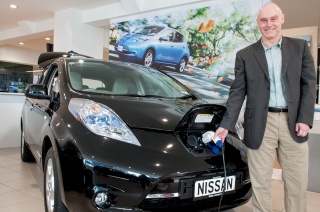Electric cars bring environmental benefits
If electric vehicles were widely available, New Zealanders would buy enough of them to reduce greenhouse gas emissions from the transport sector by one-fifth over the next 18 years, new research from Victoria University of Wellington shows.
PhD researcher Doug Clover says there are currently only a couple of hundred electric vehicles on the road in New Zealand, but his study into the preferences of potential car buyers shows people are keen to purchase them.
 “I surveyed people intending to buy a car in the next five years and found that if electric vehicles were easy to buy now, 20 percent of those surveyed would choose them.”
“I surveyed people intending to buy a car in the next five years and found that if electric vehicles were easy to buy now, 20 percent of those surveyed would choose them.”
Doug then used a type of behavioural modelling known as discrete choice to estimate demand for electric vehicles up until 2030. His projections used the information gathered in his survey and scenarios of different levels of government support and different rates of improvement in electric vehicle (EV) technology.
“In all the scenarios,” says Doug, “plug-in hybrid cars (which can be switched to fuel when battery life runs out) are the most popular option, followed by city EVs, or small electric vehicles, with a range of around 100 kilometres.”
Family car replacements – larger EVs which can seat five to seven people, tow a trailer and have a range of around 300 kilometres – were consistently the least popular option due to the high cost of batteries says Doug, never making up more than 12 percent of the EV fleet by 2030.
But while Doug’s research found that EVs have potential to make a significant dent in the greenhouse gas emissions produced by cars and light vehicles in New Zealand, the gains would be wiped out by continued use of coal-fired electricity generation.
“Under current conditions, with a low price on carbon, it still makes economic sense to use coal plants to meet the increasing demand for electricity. The price of carbon needs to rise to ensure that this rising demand for electricity is met through the use of renewable energy, which we have plenty of in New Zealand.”
There are currently around 2.6 million light vehicles in the national fleet and New Zealanders drive, on average, 38 kilometres a day.
That, says Doug, makes EVs viable as most current models have a driving range of between 100 and 150 kilometres before the battery needs to be recharged. He says an EV is around three to five times more efficient than a vehicle powered by the conventional internal combustion engine.
Doug believes EVs are potentially a ‘game-breaking’ technology, although his research shows there are barriers to uptake.
“The biggest ones are the high purchase price, limited driving range and access to battery charging facilities. If the Government wants to encourage uptake of EVs, what would make the most difference is having a network of easily accessible charging points, especially for those living in apartments or with no garage.”
Energy storage is also an issue says Doug. “When a battery can no longer power an EV, it still retains around 80 percent of its capacity. We need to be looking at ways of reconditioning them and selling them for other purposes.”
Doug has had a career working in energy and transport policy roles for government agencies and as a consultant but he says completing a PhD was one of the most difficult and challenging assignments he’s undertaken.
“The problem solving I had to do really stretched me in new ways.”



